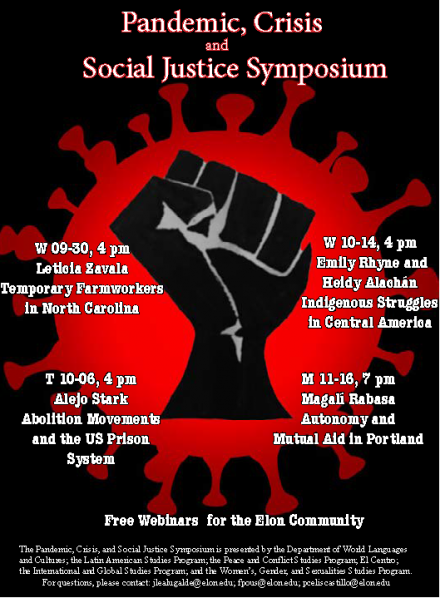The four virtual lectures by scholars and activists were coordinated by the Department of World Languages and Cultures, El Centro, and programs of Latin American Studies, Peace and Conflict Studies Program, International and Global Studies, and the Women's, Gender, and Sexualities Studies.
The Pandemic, Crisis and Social Justice Symposium will cover some of the most urgent social justice issues related to the ongoing crisis from the coronavirus pandemic and its consequences in our global society.
 Through four videoconferences, the symposium explores how the pandemic has worsened the circumstances faced by different communities in the US and Latin America, and how these challenging times have re-shaped the struggles for social justice. The symposium will teach about the impact of COVID-19 on immigrant workers in the plantations of North Carolina, on the indigenous people from Central America, on the inmates in the prison industrial complex, and on autonomous organizations and social movements in Portland, Oregon. The events provide opportunities to discuss and explore different activist initiatives, political responses, and community-based projects that have confronted the adversities provoked by the pandemic.
Through four videoconferences, the symposium explores how the pandemic has worsened the circumstances faced by different communities in the US and Latin America, and how these challenging times have re-shaped the struggles for social justice. The symposium will teach about the impact of COVID-19 on immigrant workers in the plantations of North Carolina, on the indigenous people from Central America, on the inmates in the prison industrial complex, and on autonomous organizations and social movements in Portland, Oregon. The events provide opportunities to discuss and explore different activist initiatives, political responses, and community-based projects that have confronted the adversities provoked by the pandemic.
The Pandemic, Crisis and Social Justice Symposium is presented by the Department of World Languages and Cultures; the Latin American Studies Program; the Peace and Conflict Studies Program; El Centro; the International and Global Studies Program; and the Women’s, Gender, and Sexualities Studies Program.
The webinars will be on Zoom and include:
Wednesday, Sept. 30, at 4 p.m. EST
“Temporary Migrant Workers and Contemporary Struggles in the Fields of North Carolina” by Leticia Zavala (Farmer Labor Organizing Committee).
Leticia Zavala if the former vice president of the Farmer Labor Organizing Committee (FLOC), a labor organization with more than 50 years of trajectory pursuing social justice for farmworkers in the United States. This organization has been internationally recognized because of its exceptional and pioneering struggles defending immigrant workers’ rights. In her talk, Leticia Zavala will explore the pandemic’s effect on temporary immigrant workers in tobacco, cotton, Halloween pumpkins, and Christmas pines plantations in North Carolina. She will explain the conditions that farmworkers are confronting today and will approach the current initiatives organized by FLOC to seek social justice.
Tuesday, Oct. 6, at 4 p.m. EST
“Prison Abolition in Times of Pandemia” by Dr. Alejo Stark (University of Michigan).
Dr. Alejo Stark is a founding member of the project “Rustbelt Abolition Radio” that creates podcasts about prisoners and prisons in the US and around the world. In his talk, Stark will explore how the pandemic urgently raises the need to question the incarceration system, asking for safer alternatives for the inmates facing the coronavirus’s danger. He will approach abolitionism as an evolving social movement, and he will share his knowledge about the rise of social struggles and strikes that have emerged inside correctional facilities and other penitentiary complexes in the last year. Stark will also share his experience organizing community-based projects, alternative media and podcasts on social justice.
Wednesday, Oct.14, at 4 p.m. EST
“Remembering Berta Cáceres and the Struggles of Indigenous People in Honduras” by Emily Rhyne (Witness for Peace Southeast) and Heidy Alachán (Movimiento Amplio por la Dignidad y la Justicia).
Emily Rhyne is the director of Witness for Peace Southeast (WFP) and Heidy Alachán is a lawyer and activist with Movimiento Amplio por la Dignidad y la Justicia (MADJ). WFP is a Unites States-based organization whose mission seeks to support social justice and peace in Latin America; and MADJ is a social and political movement committed to working against impunity and corruption, while building alternatives rooted in transparency, dignity and respect to human rights and the environment. In their talk, they will approach the case of Berta Cáceres’, a feminist leader for her Lenca culture and an internationally recognized environmental defender who was killed in 2016 after opposing a hydroelectric project in Honduras. They will also discuss the legacy of Berta Cáceres and the ongoing struggles of indigenous people against the adverse impacts caused by the coronavirus crisis in Latin America. Portions of this talk will be in Spanish
Monday, Nov. 16, at 7 p.m. EST
“Notes from Portland: Mutual Aid in Pandemic and Protest” by Dr. Magalí Rabasa (Lewis & Clark College).
Dr. Magalí Rabasa is assistant professor of Hispanic Studies at Lewis & Clark College and the author of “The Book in Movement: Autonomous Politics and the Lettered City Underground” (University of Pittsburgh Press, 2019). She is also an activist based in Portland, Oregon. Among other initiatives, she participated in the “Pandemic Solidarity” book project and in La Colectiva de la Comida. From a mother perspective, she will share her experience with community-based projects and social movements in one of the most critical cities since the re- emergence of Black Lives Matter movements in 2020. She will explore how autonomous organizations are developing specific strategies to cooperate and address the impact of the present crisis. She will also share her experience on teaching about solidarity and mutual aid in the context of the BLM rebellions and the pandemic.
All the webinars are free for the Elon community. Each event will consist of a 40-minute conference followed by 20 minutes of Q&A. Further information and flyers for each event will be shared before the corresponding dates.
For more information contact:
Juan Leal Ugalde: jlealugalde@elon.edu
Pablo Celis-Castillo: pceliscastillo@elon.edu
Federico Pous: fpous@elon.edu


